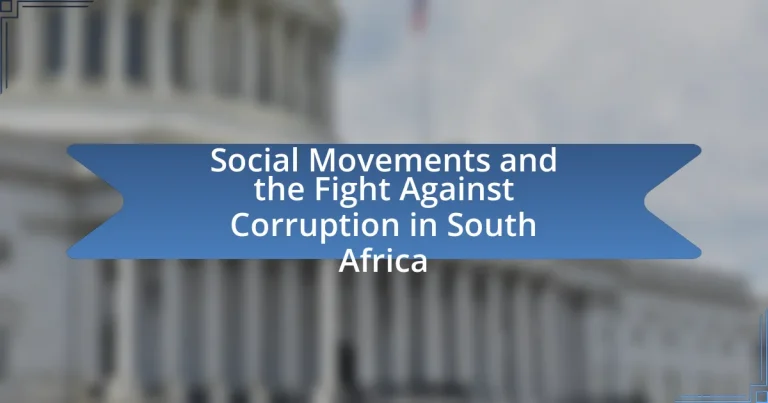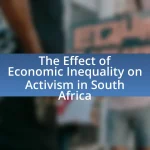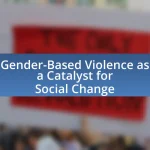Social movements in South Africa are organized efforts aimed at promoting social change and combating corruption. These movements, such as #FeesMustFall and #ZumaMustFall, have played a significant role in raising awareness, mobilizing citizens, and advocating for policy reforms to address corruption within government institutions. The article explores the emergence of these movements in response to systemic corruption, the historical context of apartheid’s influence, and the strategies employed to engage communities and hold officials accountable. It also highlights key events that have galvanized public action, the impact of grassroots organizations, and the ongoing challenges faced in the fight against corruption.
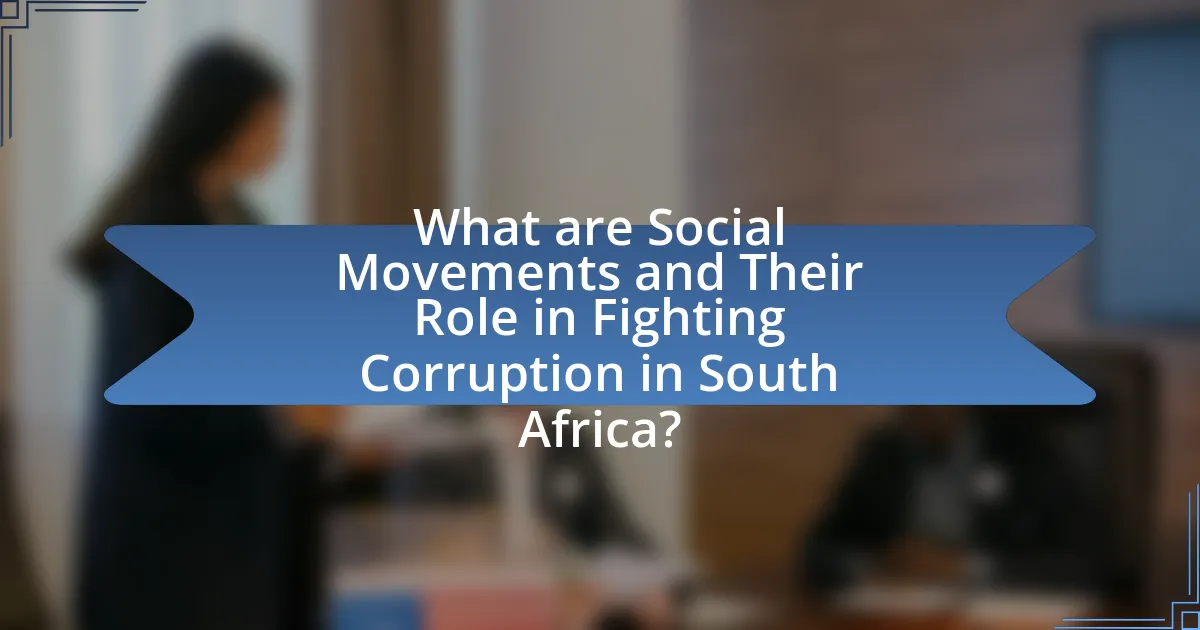
What are Social Movements and Their Role in Fighting Corruption in South Africa?
Social movements in South Africa are organized efforts by groups of people to promote social change and address issues such as corruption. These movements play a crucial role in fighting corruption by raising awareness, mobilizing citizens, and advocating for policy reforms. For instance, movements like #FeesMustFall and #ZumaMustFall have successfully highlighted government corruption and demanded accountability, leading to significant political changes. The effectiveness of these movements is evidenced by the increased public engagement in political processes and the pressure they exert on government officials to act against corrupt practices.
How do social movements emerge in the context of corruption?
Social movements emerge in the context of corruption primarily as a response to perceived injustices and the failure of institutions to address grievances. In South Africa, for instance, widespread corruption has led to public disillusionment with government officials, prompting citizens to mobilize for accountability and transparency. Historical examples include the rise of movements like #FeesMustFall and #ZumaMustFall, which gained traction as citizens protested against corrupt practices and demanded systemic change. These movements often leverage social media to organize, raise awareness, and amplify their messages, demonstrating the power of collective action in confronting corruption.
What factors contribute to the rise of social movements against corruption?
The rise of social movements against corruption is primarily driven by widespread public discontent with government practices and a demand for accountability. Factors such as economic inequality, lack of transparency in governance, and high-profile corruption scandals fuel public outrage and mobilize citizens. For instance, the #FeesMustFall movement in South Africa emerged in response to rising tuition fees and perceived government negligence, highlighting the intersection of economic issues and corruption. Additionally, social media platforms facilitate rapid information dissemination, allowing activists to organize and amplify their messages effectively. These elements collectively create an environment conducive to the emergence and growth of social movements aimed at combating corruption.
How do social movements mobilize communities in South Africa?
Social movements in South Africa mobilize communities through grassroots organizing, advocacy, and the use of social media to raise awareness about issues such as corruption. These movements, like the #FeesMustFall and #ZumaMustFall campaigns, effectively engage citizens by highlighting injustices and encouraging collective action. For instance, the #FeesMustFall movement successfully united students across various universities to protest against rising tuition fees, demonstrating the power of coordinated efforts in addressing systemic issues. Additionally, social movements utilize community meetings and public demonstrations to foster solidarity and empower individuals to participate in the political process, thereby enhancing civic engagement and accountability.
What historical context shapes the fight against corruption in South Africa?
The historical context that shapes the fight against corruption in South Africa is rooted in the legacy of apartheid and the subsequent transition to democracy in 1994. The apartheid regime, characterized by systemic corruption and oppression, fostered a culture of mistrust in government institutions. Following the end of apartheid, the new democratic government faced immense pressure to address corruption, particularly within the African National Congress, which had been accused of nepotism and mismanagement. The establishment of the Public Protector in 1994 and the Promotion of Access to Information Act in 2000 were significant steps aimed at increasing transparency and accountability. These developments reflect the ongoing struggle against corruption, influenced by historical injustices and the need for a more equitable society.
How has apartheid influenced contemporary social movements?
Apartheid has significantly influenced contemporary social movements by shaping the framework of resistance against systemic inequality and injustice in South Africa. The legacy of apartheid, which enforced racial segregation and discrimination from 1948 to the early 1990s, has led to ongoing struggles for social justice, economic equity, and political representation. For instance, movements such as the Economic Freedom Fighters and various grassroots organizations draw upon the historical context of apartheid to advocate for policies that address the socio-economic disparities that persist today. These movements often reference the injustices of apartheid to mobilize support and highlight the need for reform, demonstrating that the fight against corruption and inequality is rooted in the historical experiences of oppression.
What key events have galvanized public action against corruption?
Key events that have galvanized public action against corruption in South Africa include the 2012 Marikana massacre, where police killed 34 striking miners, highlighting systemic corruption and inequality. This event sparked widespread protests and movements like #FeesMustFall, which emerged in 2015, demanding accountability and transparency in government spending on education. Additionally, the 2016 revelations from the Gupta leaks exposed extensive corruption involving high-ranking officials and private interests, leading to mass mobilizations and calls for President Jacob Zuma’s resignation. These events collectively intensified public scrutiny and activism against corruption in South Africa.
What are the main objectives of social movements in this fight?
The main objectives of social movements in the fight against corruption in South Africa include promoting transparency, advocating for accountability, and mobilizing public awareness. Social movements aim to expose corrupt practices within government and private sectors, thereby fostering a culture of integrity. For instance, movements like #FeesMustFall and #ZumaMustFall have successfully raised awareness about corruption and demanded systemic reforms, leading to significant political discourse and policy changes. These movements utilize protests, social media campaigns, and community engagement to galvanize support and pressure authorities to act against corruption, demonstrating their effectiveness in influencing public policy and governance.
How do these movements define corruption in South Africa?
Social movements in South Africa define corruption as the abuse of power for personal gain, undermining democratic processes and public trust. These movements, such as the #FeesMustFall and #ZumaMustFall campaigns, highlight systemic issues like nepotism, bribery, and misallocation of public resources, which have been prevalent in government institutions. For instance, the Public Protector’s report on state capture revealed extensive corruption involving high-ranking officials and private entities, illustrating the detrimental impact of such practices on society and governance.
What strategies do social movements employ to combat corruption?
Social movements employ various strategies to combat corruption, including advocacy, public mobilization, and legal action. Advocacy efforts often focus on raising awareness about corrupt practices and demanding accountability from government officials. Public mobilization involves organizing protests and campaigns to engage citizens and pressure authorities to address corruption. Legal action can include filing lawsuits or supporting legislation aimed at increasing transparency and reducing opportunities for corrupt behavior. For instance, movements like the #FeesMustFall campaign in South Africa not only highlighted issues of corruption in higher education funding but also galvanized widespread public support for reform.
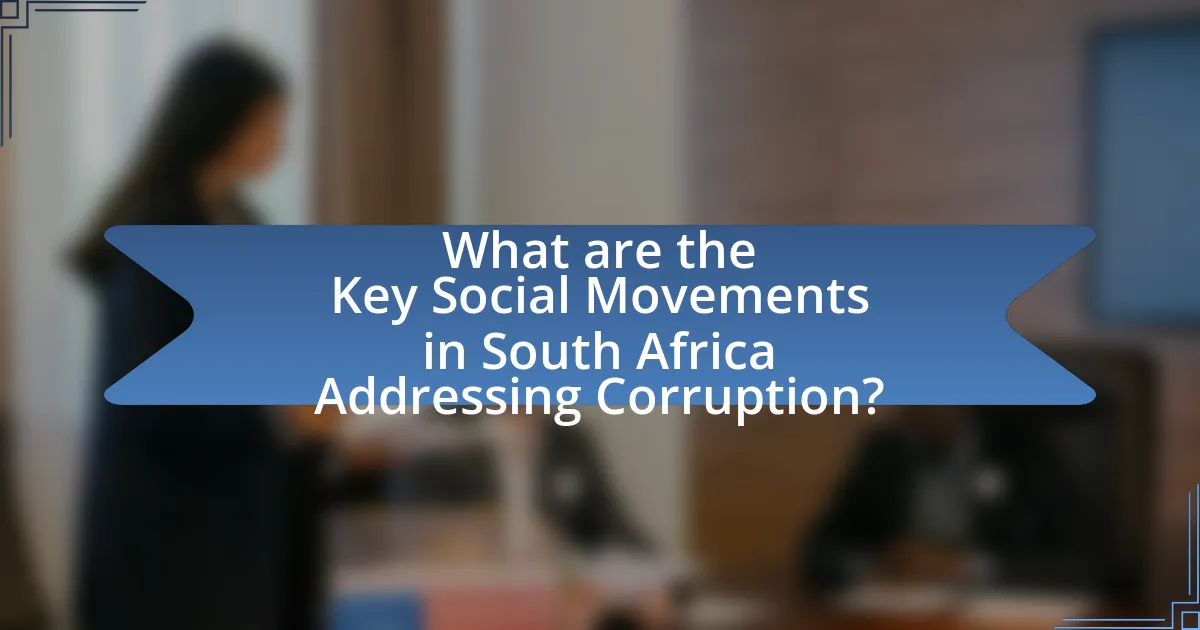
What are the Key Social Movements in South Africa Addressing Corruption?
The key social movements in South Africa addressing corruption include the #FeesMustFall movement, the Right2Know Campaign, and the Economic Freedom Fighters (EFF). The #FeesMustFall movement, which began in 2015, focuses on the financial injustices in higher education and has highlighted issues of mismanagement and corruption within universities. The Right2Know Campaign advocates for transparency and accountability in government and corporate sectors, emphasizing the need for access to information to combat corruption. The EFF, a political party founded in 2013, actively campaigns against corruption in government, calling for the nationalization of key industries and the prosecution of corrupt officials. These movements have mobilized public support and raised awareness about corruption in South Africa, contributing to ongoing discussions about governance and accountability.
Which movements have gained prominence in recent years?
The movements that have gained prominence in recent years in South Africa include the #FeesMustFall movement, which advocates for affordable education, and the #TotalShutDown campaign, focusing on gender-based violence and women’s rights. The #FeesMustFall movement emerged in 2015, mobilizing students against tuition fee increases and demanding free education, which has led to significant policy discussions and reforms in higher education funding. The #TotalShutDown campaign, initiated in 2018, has organized nationwide protests to raise awareness about the high rates of gender-based violence, influencing public discourse and prompting government action on related legislation. These movements reflect a growing public engagement with social justice issues and have been instrumental in shaping policy and societal attitudes in South Africa.
What are the goals of the #FeesMustFall movement?
The goals of the #FeesMustFall movement are to eliminate tuition fees for higher education in South Africa and to address the broader issues of accessibility and affordability in the education system. The movement emerged in response to proposed fee increases at universities, highlighting the financial barriers faced by students, particularly from disadvantaged backgrounds. It advocates for free education as a constitutional right, emphasizing that education should be accessible to all, regardless of socio-economic status. The movement gained significant traction in 2015, leading to nationwide protests and discussions about the funding of public universities and the need for systemic reform in the education sector.
How has the #GuptaLeaks movement impacted public perception of corruption?
The #GuptaLeaks movement has significantly heightened public awareness and concern regarding corruption in South Africa. This movement exposed extensive corruption involving the Gupta family and high-ranking government officials, leading to widespread outrage and calls for accountability. The revelations from the leaks, which included emails detailing corrupt dealings and influence over state resources, shifted public perception by illustrating the depth of corruption within the government. As a result, citizens became more vigilant and critical of political leaders, fostering a climate of distrust towards institutions perceived as complicit in corrupt practices. The movement also spurred increased media coverage and public discourse on corruption, reinforcing the notion that systemic corruption must be addressed to restore integrity in governance.
What role do grassroots organizations play in these movements?
Grassroots organizations play a crucial role in social movements against corruption in South Africa by mobilizing communities, raising awareness, and advocating for accountability. These organizations often serve as the backbone of local activism, empowering citizens to participate in the democratic process and demand transparency from government officials. For instance, movements like the #FeesMustFall and #ZumaMustFall have been significantly driven by grassroots efforts, illustrating how local groups can effectively challenge systemic corruption and influence national discourse. Their ability to organize protests, disseminate information, and build coalitions enhances the overall impact of these movements, demonstrating the essential function of grassroots organizations in fostering civic engagement and driving social change.
How do local communities engage with national anti-corruption efforts?
Local communities engage with national anti-corruption efforts by participating in advocacy, raising awareness, and collaborating with governmental and non-governmental organizations. For instance, community-based organizations often mobilize residents to report corruption, thereby increasing transparency and accountability. In South Africa, initiatives like the Public Protector’s office encourage citizens to lodge complaints about corruption, demonstrating active community involvement. Additionally, local forums and workshops educate citizens on their rights and the importance of integrity in governance, fostering a culture of accountability. These actions collectively strengthen the national anti-corruption framework by ensuring that local voices are heard and considered in policy-making processes.
What challenges do grassroots movements face in South Africa?
Grassroots movements in South Africa face significant challenges, including limited access to resources, governmental repression, and internal divisions. Limited funding and support hinder their ability to mobilize effectively and sustain campaigns. Governmental repression manifests through legal restrictions, harassment, and violence against activists, which stifles dissent and discourages participation. Additionally, internal divisions often arise from differing ideologies and strategies, leading to fragmentation and weakened collective action. These challenges impede the effectiveness of grassroots movements in addressing corruption and advocating for social justice in South Africa.
How do these movements collaborate with other entities?
Social movements in South Africa collaborate with various entities, including non-governmental organizations (NGOs), community groups, and international bodies, to amplify their impact against corruption. These collaborations often involve joint campaigns, resource sharing, and strategic alliances that enhance advocacy efforts. For instance, movements like #FeesMustFall have partnered with NGOs such as Corruption Watch to address issues of financial mismanagement in education. This partnership has led to increased visibility and support for their cause, demonstrating the effectiveness of collaborative efforts in mobilizing public opinion and influencing policy changes.
What partnerships exist between social movements and political parties?
Partnerships between social movements and political parties in South Africa often manifest through collaborative efforts aimed at addressing corruption and promoting accountability. For instance, the Economic Freedom Fighters (EFF) has aligned with various social movements, such as the #FeesMustFall movement, to advocate for educational reforms and anti-corruption measures. Additionally, the African National Congress (ANC) has engaged with civil society organizations like Corruption Watch to address public concerns regarding corruption. These partnerships are characterized by mutual support, where social movements mobilize grassroots activism while political parties leverage this support to influence policy and legislative changes. Such collaborations have been pivotal in shaping public discourse and driving reforms in governance.
How do movements engage with civil society organizations?
Movements engage with civil society organizations by forming strategic alliances to amplify their advocacy efforts and mobilize resources. These collaborations enable movements to leverage the established networks, expertise, and legitimacy of civil society organizations, enhancing their capacity to address issues such as corruption. For instance, in South Africa, movements like the #FeesMustFall campaign partnered with organizations such as the South African Students’ Congress to advocate for educational reforms, demonstrating how collective action can lead to significant policy changes. This engagement not only strengthens the movements’ influence but also fosters a broader societal dialogue on corruption and accountability.
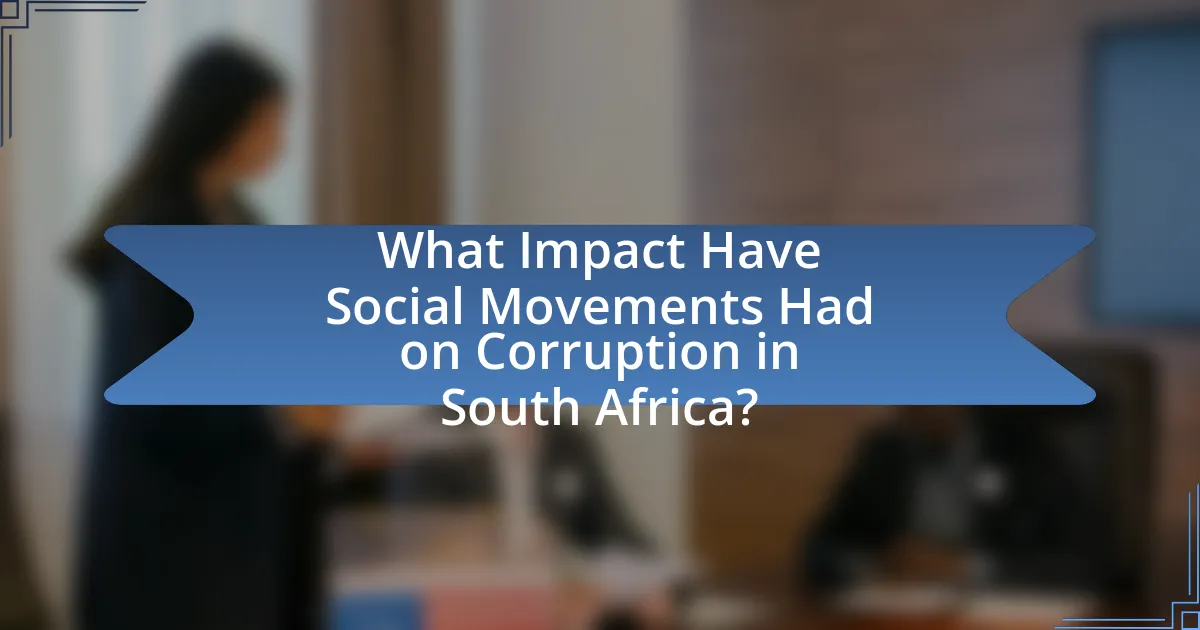
What Impact Have Social Movements Had on Corruption in South Africa?
Social movements in South Africa have significantly impacted corruption by raising public awareness, mobilizing citizens, and pressuring government accountability. For instance, movements like the #FeesMustFall and #ZumaMustFall campaigns have highlighted issues of corruption and mismanagement, leading to increased scrutiny of political leaders and institutions. The Public Protector’s investigations, spurred by these movements, have resulted in high-profile resignations and legal actions against corrupt officials, demonstrating the effectiveness of grassroots activism in combating corruption.
How have social movements influenced policy changes?
Social movements have significantly influenced policy changes in South Africa by mobilizing public support and pressuring government accountability. For instance, the anti-apartheid movement, which included organizations like the African National Congress, led to the dismantling of apartheid laws and the establishment of a democratic government in the 1990s. Additionally, contemporary movements such as #FeesMustFall have successfully advocated for changes in higher education funding policies, resulting in increased government allocations for student financial aid. These movements demonstrate the power of collective action in shaping legislative agendas and prompting reforms that address systemic issues, such as corruption and inequality.
What legislative reforms have been prompted by social movements?
Legislative reforms prompted by social movements in South Africa include the establishment of the Public Protector’s Office and the Promotion of Access to Information Act. These reforms emerged from widespread public demand for transparency and accountability in government, particularly in response to corruption scandals. The Public Protector’s Office was created in 1994 to investigate misconduct in state affairs, reflecting the influence of civil society organizations advocating for good governance. Additionally, the Promotion of Access to Information Act, enacted in 2000, aimed to enhance citizens’ rights to access government information, further driven by social movements emphasizing the need for open governance.
How do movements hold government officials accountable?
Movements hold government officials accountable by mobilizing public opinion, advocating for transparency, and demanding policy changes. In South Africa, social movements such as the #FeesMustFall and #ZumaMustFall campaigns have effectively pressured officials to address corruption and mismanagement. These movements utilize protests, social media, and public discourse to raise awareness and create a sense of urgency around accountability issues. For instance, the #ZumaMustFall movement played a crucial role in the resignation of former President Jacob Zuma in 2018, highlighting the power of collective action in influencing political outcomes.
What successes can be attributed to these movements?
Social movements in South Africa have successfully raised awareness and mobilized public opinion against corruption, leading to significant political changes. For instance, the #FeesMustFall movement not only highlighted issues of financial mismanagement in universities but also resulted in policy changes regarding tuition fees, demonstrating the power of collective action. Additionally, the #GuptaLeaks revelations, driven by civil society activism, exposed extensive corruption involving the Gupta family and high-ranking officials, prompting investigations and increased scrutiny of government practices. These movements have fostered a culture of accountability, influencing both public discourse and legislative reforms aimed at combating corruption.
How have public attitudes towards corruption shifted due to social movements?
Public attitudes towards corruption in South Africa have shifted significantly due to social movements, leading to increased awareness and demand for accountability. Movements such as #FeesMustFall and #ZumaMustFall mobilized citizens, highlighting corruption in government and public institutions, which resulted in a greater public intolerance for corrupt practices. According to a 2019 Afrobarometer survey, 62% of South Africans expressed a desire for government accountability, reflecting a notable change in public sentiment influenced by these movements. This shift indicates a growing expectation for transparency and integrity in governance, driven by grassroots activism and collective action against corruption.
What notable victories have movements achieved in recent years?
Social movements in South Africa have achieved notable victories in recent years, particularly in the fight against corruption. One significant victory was the successful campaign that led to the resignation of former President Jacob Zuma in 2018, following widespread protests and public pressure from movements like #ZumaMustFall. This movement galvanized citizens and highlighted systemic corruption within the government, resulting in increased accountability measures. Additionally, the establishment of the Zondo Commission in 2018 to investigate state capture and corruption has been a direct outcome of these movements, showcasing their impact on national governance and policy reform.
What challenges remain in the fight against corruption?
The challenges that remain in the fight against corruption in South Africa include systemic issues such as weak institutional frameworks, lack of political will, and inadequate enforcement of anti-corruption laws. These systemic issues hinder effective governance and accountability, allowing corrupt practices to persist. For instance, the 2021 State Capture Inquiry revealed extensive corruption involving high-ranking officials and state-owned enterprises, highlighting the need for stronger regulatory mechanisms and transparency measures. Additionally, public trust in institutions has eroded, complicating efforts to mobilize civil society against corruption.
How do social movements address ongoing corruption issues?
Social movements address ongoing corruption issues by mobilizing public awareness, advocating for policy changes, and holding government officials accountable. For instance, movements like #FeesMustFall and #ZumaMustFall in South Africa have galvanized citizens to protest against corruption and mismanagement, leading to significant political discourse and reforms. These movements utilize social media platforms to disseminate information rapidly, engage a broader audience, and organize protests, which have resulted in increased scrutiny of government actions and demands for transparency. The effectiveness of these movements is evidenced by the resignation of former President Jacob Zuma in 2018, which was largely attributed to sustained public pressure from various social movements highlighting corruption within his administration.
What strategies can enhance the effectiveness of these movements?
Strategies that can enhance the effectiveness of social movements against corruption in South Africa include grassroots mobilization, coalition-building, and leveraging digital platforms for awareness. Grassroots mobilization empowers local communities to actively participate in advocacy, increasing the movement’s reach and impact. Coalition-building among various organizations and stakeholders fosters a united front, amplifying voices and resources, which has been shown to strengthen campaigns, as seen in the #FeesMustFall movement that united students across universities. Additionally, utilizing digital platforms for awareness allows for rapid dissemination of information and engagement, exemplified by the success of social media campaigns that have raised public consciousness about corruption issues, leading to increased public pressure on authorities.
What practical steps can individuals take to support anti-corruption efforts?
Individuals can support anti-corruption efforts by actively participating in transparency initiatives and holding public officials accountable. Engaging in community awareness campaigns helps educate others about the impacts of corruption, while reporting suspicious activities to relevant authorities fosters a culture of accountability. Additionally, supporting organizations that advocate for anti-corruption policies, such as Transparency International, strengthens collective efforts against corruption. Research indicates that public participation in governance can significantly reduce corruption levels, as seen in various case studies across South Africa.
